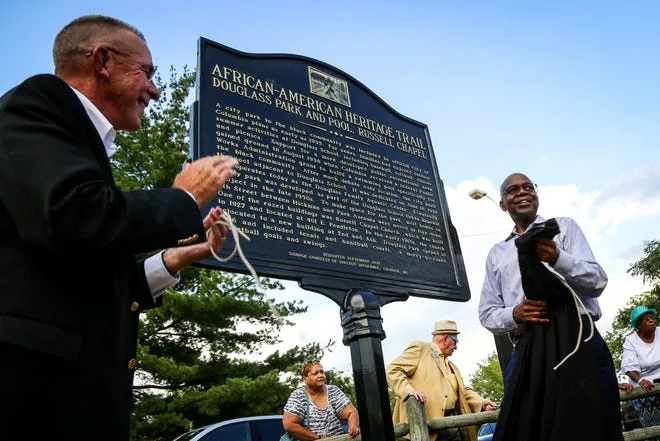
When Jim Whitt moved to Columbia from Indiana, he joined the congregation of Second Missionary Baptist Church. It was here he first learned of the Sharp End, Columbia’s historic Black business district on Walnut Street.
He would go on to form the Sharp End Heritage Committee in 2016, leading to the installation of the African-American Heritage Trail historic markers in the downtown Columbia area. He also would found the Sharp End Entrepreneurial Development Fund in 2018, which provided what it dubbed SEED grants, using initial letters of the fund’s name, to support minority- and women-owned businesses.
More:The ‘journey of love’ to commemorate Black history in Columbia’s Sharp End
The mission of that fund has expanded this year through the addition of entrepreneurial workshops. The fund slightly changed its name in February to the James and Annelle Whitt Entrepreneurial Development Foundation. Jim and Annelle Whitt were married until his death in 2021.

To ensure the fund, expansion of services and Jim Whitt’s legacy continues, the organization will hold inaugural dual fundraising events Aug. 15.
“As I was going through some of his paperwork (following his death) I saw he had a plan to take the Sharp End Entrepreneurial Development Fund to another level; to provide training and workshops to have a more holistic approach to providing not only financial support, but the type of business and professional leadership support that some minority and business owners could benefit from,” said Annelle Whitt, foundation board president.
More:Remembering the importance and removal of Columbia’s Sharp End
Registration starts 8 a.m. Aug. 15 for a golf tournament at the A.L. Gustin Golf Course at 18 Stadium Blvd. Thirteen teams already have signed up, and there is capacity for 18, said tournament co-chair Darryl Smith, a longtime friend of Jim Whitt. He does hope for more participants, though. Single players will be paired up with teams, according to event information.
The event is open to those 21 and older. A breakfast and lunch will be served. There are opportunities to win awards for closest to the pin, putting and other competitions.
Following the tournament is the evening dinner starting 6 p.m. at Big Daddy’s BBQ and Soul Food Restaurant on Paris Road. That event also will feature the premiere of the documentary “The Life and Legacy of James Arthur Whitt Sr.”
“Jim Whitt was an avid golfer and an excellent golfer. I know many people will come out and support (the tournament),” Smith said. “I am looking forward to the dinner. … We will use that event to do some community building.
“That is what Jim was known for. He was all about building relationships and creating positive change in our community.”
From February:60 vendors ready to showcase Columbia Black-owned businesses in expo at Columbia College
This is the first year for the dual fundraiser and the foundation plans to make it an annual event. Money raised will ensure the foundation continues to provide SEED grants and also bring in subject-matter experts for the business workshops, Whitt said.
“During (Jim’s) illness, golf was one of the places he could find peace,” she said, adding the group of friends Jim Whitt played with was known as the CoMo Crew. “They really supported him.”
How the foundation helps
The SEED grants provided by the foundation help awardees buy the equipment they may need to let their business thrive, Whitt said.
Seed money doesn’t go toward day-to-day operations or inventory, but what could help make inventory. So, a person with a clothing retail business, the foundation SEED grant wouldn’t purchase the merchandise, but would help pay for the clothing racks for display, Whitt said as an example.
“We have bought things like commercial popcorn poppers or commercial ovens (through SEED grants),” she said, as further examples. “We are purchasing things that are going to help you generate revenue.”
The next application period for seed grants starts Sept. 1. Grant applications are reviewed and a shortlist of applicants then participate in quasi-pitch competition before the selection committee.

Workshops are free to those with annual revenue less than $300,000. Those with more than $300,000 pay a fee to participate.
“So far, we have not had anyone have to pay for a workshop,” Whitt said.
There are three levels of workshops: entrepreneurial development 101, 102 and 103. The 101 gives an overarching review of what it takes to run a business, before getting into more details in the 102 and 103 workshops. There can be supplemental workshops, such as on developing mission and vision statements.
Workshops — held a couple times per month in the evening hours or on Saturdays — include a Central Bank partnership with its ProsperU program on financial literacy.
More:Sharp End project started ‘on faith’ realized in heritage trail dedication
“We are going to have a legal workshop probably in September,” Whitt said. “… We try to take complicated subjects and make them as digestible as possible. So, in plain English and we do a lot of practical applications through hands-on activities, no matter the subject matter.”
The workshops and grants give those supported a fighting chance at success, eventually adds jobs to the economy and can go to address income disparities, she added. Total SEED grants of more than $100,000 since 2018 have supported more than 56 minority- and women-owned businesses. There are separate funds for the seed grants and the foundation to provide workshops.
“(Jim) found joy in the success of minority- and women-owned businesses. I am finding that same joy,” Whitt said.
Charles Dunlap covers local government, community stories and other general subjects for the Tribune. You can reach him at cdunlap@columbiatribune.com or @CD_CDT on Twitter. Subscribe to support vital local journalism.


